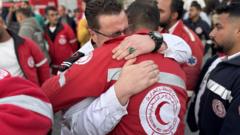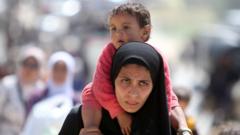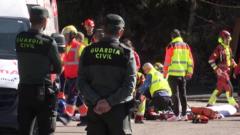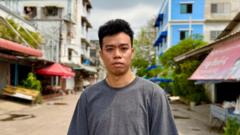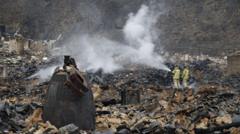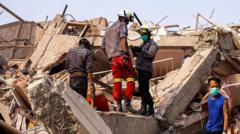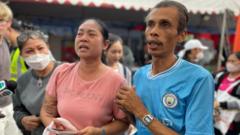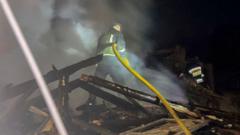The country grapples with shattered infrastructure and a desperate need for assistance, as locals painstakingly search for survivors among the rubble.
**Myanmar Struggles Amid Catastrophic Quake Aftermath, Death Toll Surges**
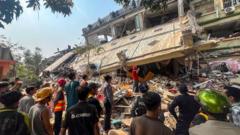
**Myanmar Struggles Amid Catastrophic Quake Aftermath, Death Toll Surges**
As the death toll surpasses 1,600, Myanmar faces dire challenges in rescue operations following a devastating earthquake.
The recent earthquake in Myanmar has claimed over 1,600 lives, leaving communities devastated and search operations hindered by a lack of equipment and poor infrastructure. In Mandalay, the nation’s second-largest city, many people have resorted to digging through debris with their bare hands in search of missing loved ones. Rescuers managed to pull a woman alive from the ruins of a collapsed 12-story building after 30 hours, yet the situation remains critical with over 90 individuals still believed trapped beneath the wreckage, according to Red Cross reports.
The UN's humanitarian agency, OCHA, has alerted that transportation issues are exacerbating the crisis, with roads and bridges severed, leading to insufficient medical supplies and difficulties in coordinating rescue efforts. Footage shared online shows citizens working fervently to free trapped individuals, illustrating the chaotic environment where helpless screams for aid grow louder as time passes.
Despite international aid beginning to trickle in, numerous regions remain isolated, lacking even basic communication due to widespread damage. A local resident expressed frustration over the uncoordinated response, stating, “Locals have had to fend for themselves," as overwhelmed hospitals struggle to manage the influx of casualties.
The military junta's report indicates significant infrastructure damage in Mandalay, with an estimated 1,500 buildings affected. Power outages and disrupted services are compounding the situation, potentially delaying recovery efforts for days. Meanwhile, significant challenges persist in accessing affected areas, particularly as bridges become impassable.
In Nay Pyi Daw, the military's headquarters, there have been reports of aftershocks causing further structural collapses. Critically, while the junta has sought international aid, military operations continue against ethnic armed groups within the country, further complicating the humanitarian crisis. Tom Andrews, the UN's special rapporteur on human rights in Myanmar, condemned ongoing military actions, emphasizing the urgent need for an end to violence amidst this looming humanitarian disaster. The dual plight of rescuing survivors while responding to military aggression poses a significant dilemma for both local authorities and international responders.
The UN's humanitarian agency, OCHA, has alerted that transportation issues are exacerbating the crisis, with roads and bridges severed, leading to insufficient medical supplies and difficulties in coordinating rescue efforts. Footage shared online shows citizens working fervently to free trapped individuals, illustrating the chaotic environment where helpless screams for aid grow louder as time passes.
Despite international aid beginning to trickle in, numerous regions remain isolated, lacking even basic communication due to widespread damage. A local resident expressed frustration over the uncoordinated response, stating, “Locals have had to fend for themselves," as overwhelmed hospitals struggle to manage the influx of casualties.
The military junta's report indicates significant infrastructure damage in Mandalay, with an estimated 1,500 buildings affected. Power outages and disrupted services are compounding the situation, potentially delaying recovery efforts for days. Meanwhile, significant challenges persist in accessing affected areas, particularly as bridges become impassable.
In Nay Pyi Daw, the military's headquarters, there have been reports of aftershocks causing further structural collapses. Critically, while the junta has sought international aid, military operations continue against ethnic armed groups within the country, further complicating the humanitarian crisis. Tom Andrews, the UN's special rapporteur on human rights in Myanmar, condemned ongoing military actions, emphasizing the urgent need for an end to violence amidst this looming humanitarian disaster. The dual plight of rescuing survivors while responding to military aggression poses a significant dilemma for both local authorities and international responders.

